HRM3007 Module Assignment 2: International Expatriates Analysis
VerifiedAdded on 2022/08/12
|12
|3590
|18
Essay
AI Summary
This essay delves into the multifaceted world of international expatriates, examining the challenges they encounter and the strategies organizations employ to facilitate their success. The paper explores crucial aspects such as pre-assignment assessment, cross-cultural and language training, and the significance of preparing both expatriates and their families for the transition. It highlights the impact of cultural differences, work environment disparities, and geographical/climatic factors on expatriates' well-being and work performance. The essay emphasizes the importance of tailored training programs that address cultural adaptation, language proficiency, and understanding of the host country's norms and business practices. Furthermore, it discusses the role of Human Resource Management (HRM) in mitigating challenges like cultural shock and ensuring the expatriates' ability to thrive in their new environment by offering detailed insights and actionable solutions for both multinational corporations and expatriates. The essay underscores the need for comprehensive support systems, including pre-departure preparation, ongoing assistance, and post-arrival integration to ensure a smooth and successful international assignment.
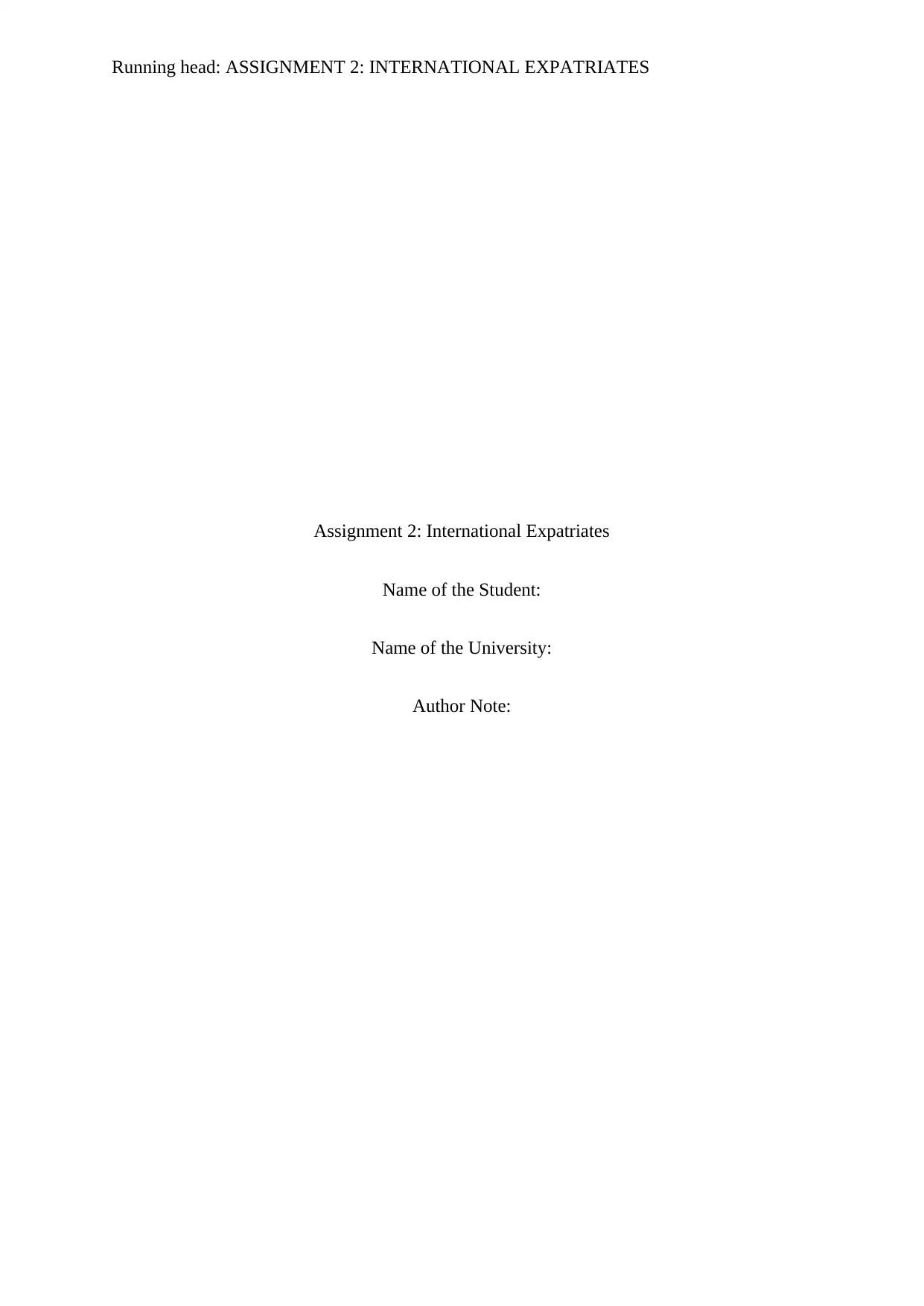
Running head: ASSIGNMENT 2: INTERNATIONAL EXPATRIATES
Assignment 2: International Expatriates
Name of the Student:
Name of the University:
Author Note:
Assignment 2: International Expatriates
Name of the Student:
Name of the University:
Author Note:
Paraphrase This Document
Need a fresh take? Get an instant paraphrase of this document with our AI Paraphraser
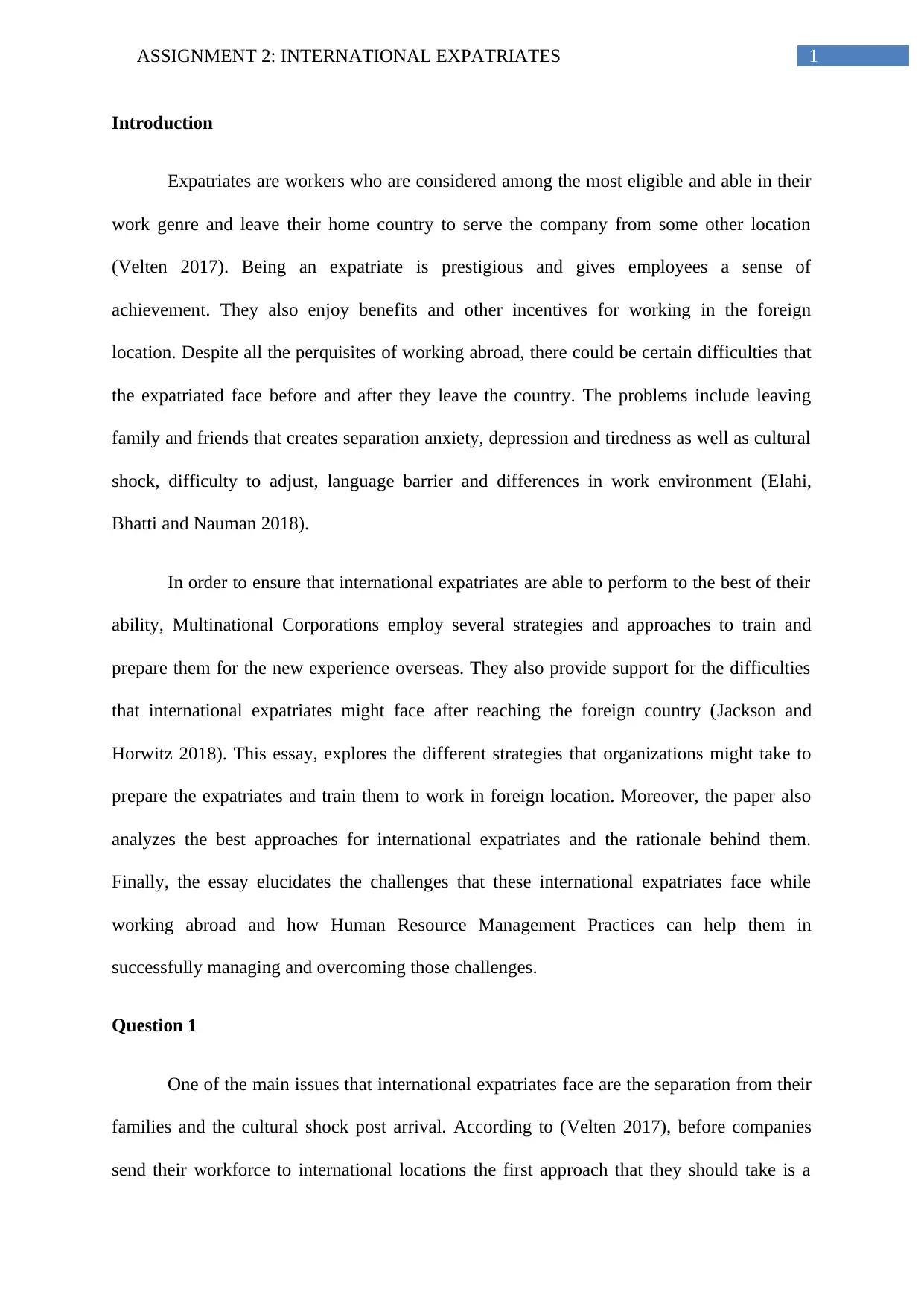
1ASSIGNMENT 2: INTERNATIONAL EXPATRIATES
Introduction
Expatriates are workers who are considered among the most eligible and able in their
work genre and leave their home country to serve the company from some other location
(Velten 2017). Being an expatriate is prestigious and gives employees a sense of
achievement. They also enjoy benefits and other incentives for working in the foreign
location. Despite all the perquisites of working abroad, there could be certain difficulties that
the expatriated face before and after they leave the country. The problems include leaving
family and friends that creates separation anxiety, depression and tiredness as well as cultural
shock, difficulty to adjust, language barrier and differences in work environment (Elahi,
Bhatti and Nauman 2018).
In order to ensure that international expatriates are able to perform to the best of their
ability, Multinational Corporations employ several strategies and approaches to train and
prepare them for the new experience overseas. They also provide support for the difficulties
that international expatriates might face after reaching the foreign country (Jackson and
Horwitz 2018). This essay, explores the different strategies that organizations might take to
prepare the expatriates and train them to work in foreign location. Moreover, the paper also
analyzes the best approaches for international expatriates and the rationale behind them.
Finally, the essay elucidates the challenges that these international expatriates face while
working abroad and how Human Resource Management Practices can help them in
successfully managing and overcoming those challenges.
Question 1
One of the main issues that international expatriates face are the separation from their
families and the cultural shock post arrival. According to (Velten 2017), before companies
send their workforce to international locations the first approach that they should take is a
Introduction
Expatriates are workers who are considered among the most eligible and able in their
work genre and leave their home country to serve the company from some other location
(Velten 2017). Being an expatriate is prestigious and gives employees a sense of
achievement. They also enjoy benefits and other incentives for working in the foreign
location. Despite all the perquisites of working abroad, there could be certain difficulties that
the expatriated face before and after they leave the country. The problems include leaving
family and friends that creates separation anxiety, depression and tiredness as well as cultural
shock, difficulty to adjust, language barrier and differences in work environment (Elahi,
Bhatti and Nauman 2018).
In order to ensure that international expatriates are able to perform to the best of their
ability, Multinational Corporations employ several strategies and approaches to train and
prepare them for the new experience overseas. They also provide support for the difficulties
that international expatriates might face after reaching the foreign country (Jackson and
Horwitz 2018). This essay, explores the different strategies that organizations might take to
prepare the expatriates and train them to work in foreign location. Moreover, the paper also
analyzes the best approaches for international expatriates and the rationale behind them.
Finally, the essay elucidates the challenges that these international expatriates face while
working abroad and how Human Resource Management Practices can help them in
successfully managing and overcoming those challenges.
Question 1
One of the main issues that international expatriates face are the separation from their
families and the cultural shock post arrival. According to (Velten 2017), before companies
send their workforce to international locations the first approach that they should take is a
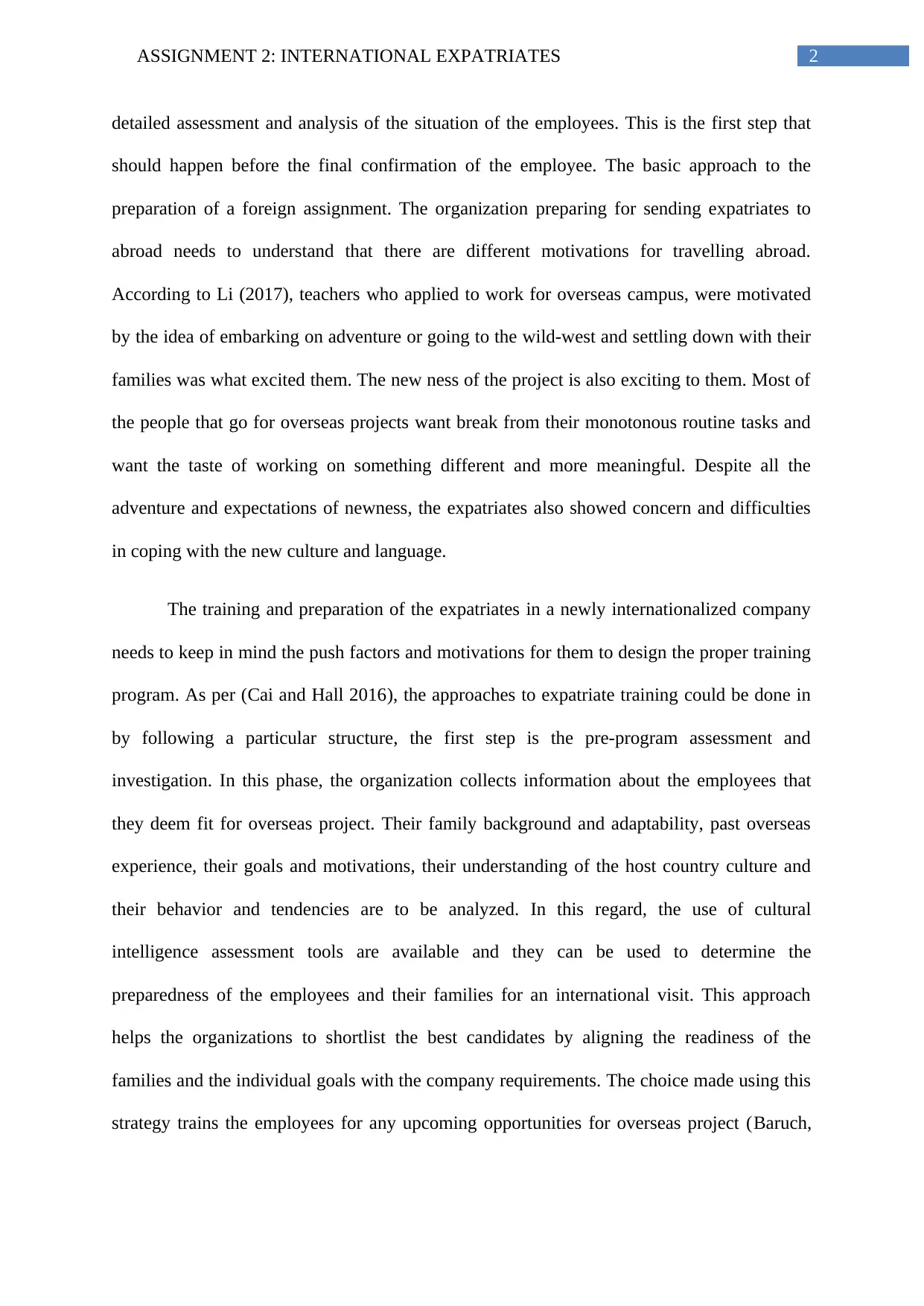
2ASSIGNMENT 2: INTERNATIONAL EXPATRIATES
detailed assessment and analysis of the situation of the employees. This is the first step that
should happen before the final confirmation of the employee. The basic approach to the
preparation of a foreign assignment. The organization preparing for sending expatriates to
abroad needs to understand that there are different motivations for travelling abroad.
According to Li (2017), teachers who applied to work for overseas campus, were motivated
by the idea of embarking on adventure or going to the wild-west and settling down with their
families was what excited them. The new ness of the project is also exciting to them. Most of
the people that go for overseas projects want break from their monotonous routine tasks and
want the taste of working on something different and more meaningful. Despite all the
adventure and expectations of newness, the expatriates also showed concern and difficulties
in coping with the new culture and language.
The training and preparation of the expatriates in a newly internationalized company
needs to keep in mind the push factors and motivations for them to design the proper training
program. As per (Cai and Hall 2016), the approaches to expatriate training could be done in
by following a particular structure, the first step is the pre-program assessment and
investigation. In this phase, the organization collects information about the employees that
they deem fit for overseas project. Their family background and adaptability, past overseas
experience, their goals and motivations, their understanding of the host country culture and
their behavior and tendencies are to be analyzed. In this regard, the use of cultural
intelligence assessment tools are available and they can be used to determine the
preparedness of the employees and their families for an international visit. This approach
helps the organizations to shortlist the best candidates by aligning the readiness of the
families and the individual goals with the company requirements. The choice made using this
strategy trains the employees for any upcoming opportunities for overseas project (Baruch,
detailed assessment and analysis of the situation of the employees. This is the first step that
should happen before the final confirmation of the employee. The basic approach to the
preparation of a foreign assignment. The organization preparing for sending expatriates to
abroad needs to understand that there are different motivations for travelling abroad.
According to Li (2017), teachers who applied to work for overseas campus, were motivated
by the idea of embarking on adventure or going to the wild-west and settling down with their
families was what excited them. The new ness of the project is also exciting to them. Most of
the people that go for overseas projects want break from their monotonous routine tasks and
want the taste of working on something different and more meaningful. Despite all the
adventure and expectations of newness, the expatriates also showed concern and difficulties
in coping with the new culture and language.
The training and preparation of the expatriates in a newly internationalized company
needs to keep in mind the push factors and motivations for them to design the proper training
program. As per (Cai and Hall 2016), the approaches to expatriate training could be done in
by following a particular structure, the first step is the pre-program assessment and
investigation. In this phase, the organization collects information about the employees that
they deem fit for overseas project. Their family background and adaptability, past overseas
experience, their goals and motivations, their understanding of the host country culture and
their behavior and tendencies are to be analyzed. In this regard, the use of cultural
intelligence assessment tools are available and they can be used to determine the
preparedness of the employees and their families for an international visit. This approach
helps the organizations to shortlist the best candidates by aligning the readiness of the
families and the individual goals with the company requirements. The choice made using this
strategy trains the employees for any upcoming opportunities for overseas project (Baruch,
⊘ This is a preview!⊘
Do you want full access?
Subscribe today to unlock all pages.

Trusted by 1+ million students worldwide
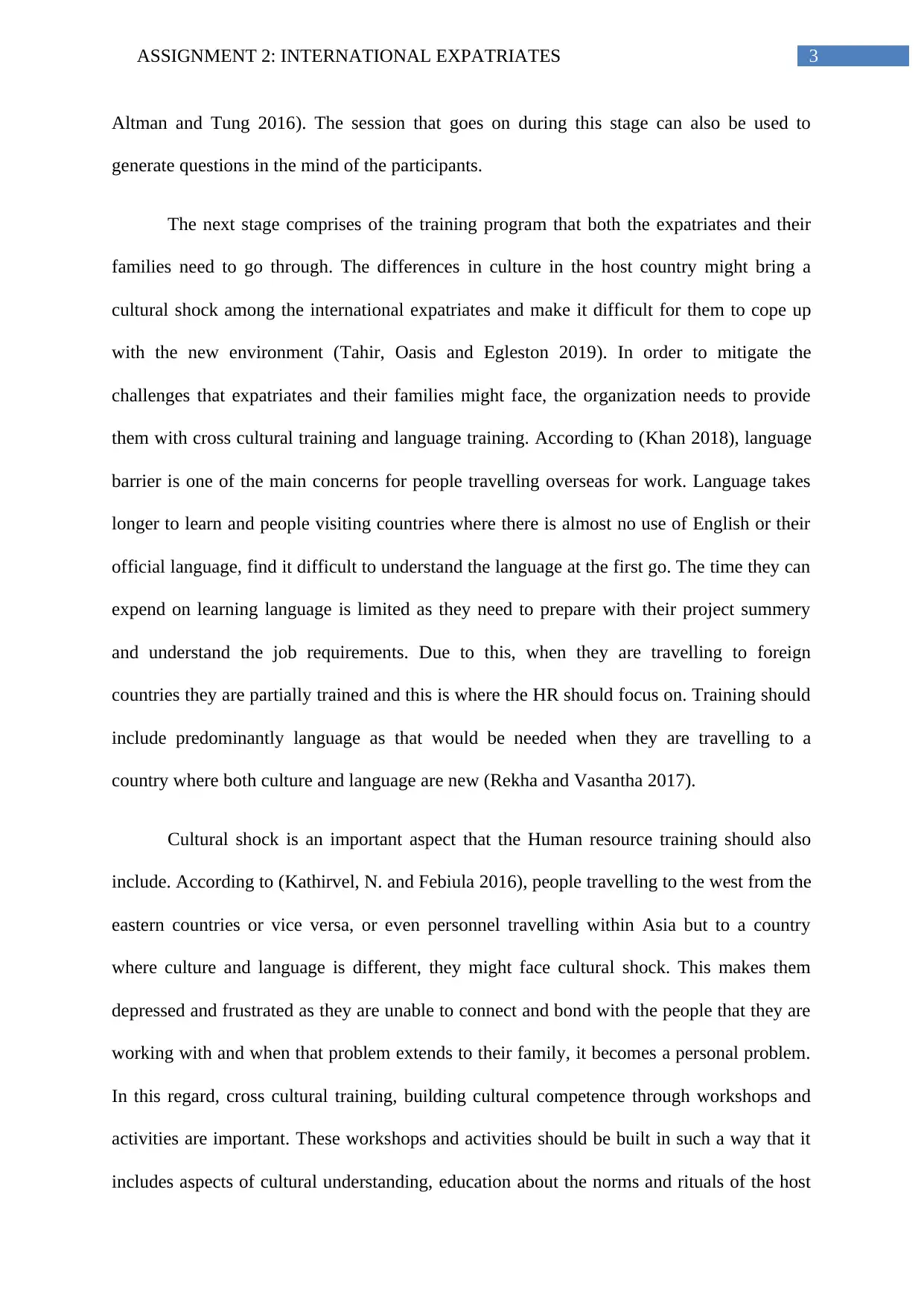
3ASSIGNMENT 2: INTERNATIONAL EXPATRIATES
Altman and Tung 2016). The session that goes on during this stage can also be used to
generate questions in the mind of the participants.
The next stage comprises of the training program that both the expatriates and their
families need to go through. The differences in culture in the host country might bring a
cultural shock among the international expatriates and make it difficult for them to cope up
with the new environment (Tahir, Oasis and Egleston 2019). In order to mitigate the
challenges that expatriates and their families might face, the organization needs to provide
them with cross cultural training and language training. According to (Khan 2018), language
barrier is one of the main concerns for people travelling overseas for work. Language takes
longer to learn and people visiting countries where there is almost no use of English or their
official language, find it difficult to understand the language at the first go. The time they can
expend on learning language is limited as they need to prepare with their project summery
and understand the job requirements. Due to this, when they are travelling to foreign
countries they are partially trained and this is where the HR should focus on. Training should
include predominantly language as that would be needed when they are travelling to a
country where both culture and language are new (Rekha and Vasantha 2017).
Cultural shock is an important aspect that the Human resource training should also
include. According to (Kathirvel, N. and Febiula 2016), people travelling to the west from the
eastern countries or vice versa, or even personnel travelling within Asia but to a country
where culture and language is different, they might face cultural shock. This makes them
depressed and frustrated as they are unable to connect and bond with the people that they are
working with and when that problem extends to their family, it becomes a personal problem.
In this regard, cross cultural training, building cultural competence through workshops and
activities are important. These workshops and activities should be built in such a way that it
includes aspects of cultural understanding, education about the norms and rituals of the host
Altman and Tung 2016). The session that goes on during this stage can also be used to
generate questions in the mind of the participants.
The next stage comprises of the training program that both the expatriates and their
families need to go through. The differences in culture in the host country might bring a
cultural shock among the international expatriates and make it difficult for them to cope up
with the new environment (Tahir, Oasis and Egleston 2019). In order to mitigate the
challenges that expatriates and their families might face, the organization needs to provide
them with cross cultural training and language training. According to (Khan 2018), language
barrier is one of the main concerns for people travelling overseas for work. Language takes
longer to learn and people visiting countries where there is almost no use of English or their
official language, find it difficult to understand the language at the first go. The time they can
expend on learning language is limited as they need to prepare with their project summery
and understand the job requirements. Due to this, when they are travelling to foreign
countries they are partially trained and this is where the HR should focus on. Training should
include predominantly language as that would be needed when they are travelling to a
country where both culture and language are new (Rekha and Vasantha 2017).
Cultural shock is an important aspect that the Human resource training should also
include. According to (Kathirvel, N. and Febiula 2016), people travelling to the west from the
eastern countries or vice versa, or even personnel travelling within Asia but to a country
where culture and language is different, they might face cultural shock. This makes them
depressed and frustrated as they are unable to connect and bond with the people that they are
working with and when that problem extends to their family, it becomes a personal problem.
In this regard, cross cultural training, building cultural competence through workshops and
activities are important. These workshops and activities should be built in such a way that it
includes aspects of cultural understanding, education about the norms and rituals of the host
Paraphrase This Document
Need a fresh take? Get an instant paraphrase of this document with our AI Paraphraser
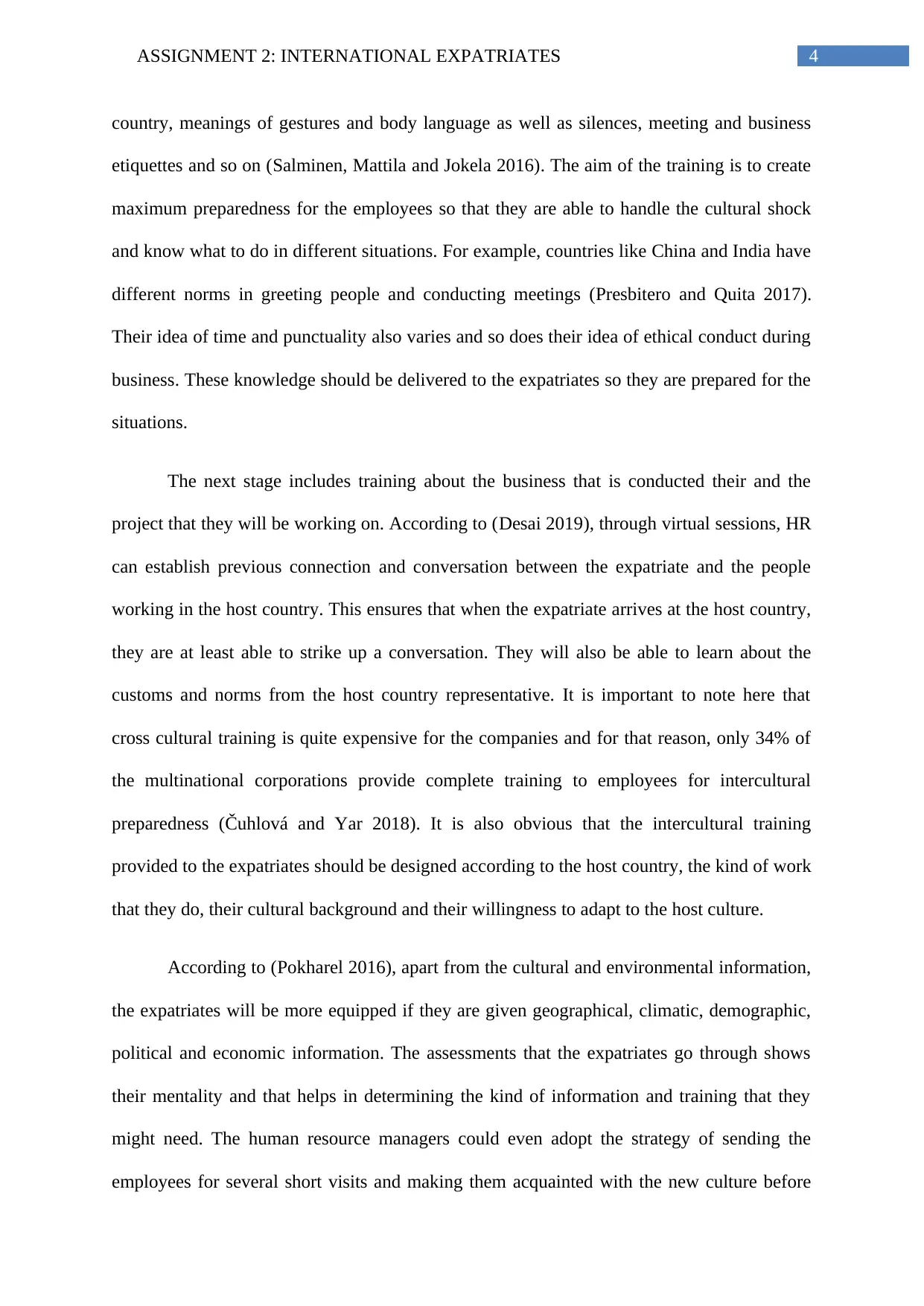
4ASSIGNMENT 2: INTERNATIONAL EXPATRIATES
country, meanings of gestures and body language as well as silences, meeting and business
etiquettes and so on (Salminen, Mattila and Jokela 2016). The aim of the training is to create
maximum preparedness for the employees so that they are able to handle the cultural shock
and know what to do in different situations. For example, countries like China and India have
different norms in greeting people and conducting meetings (Presbitero and Quita 2017).
Their idea of time and punctuality also varies and so does their idea of ethical conduct during
business. These knowledge should be delivered to the expatriates so they are prepared for the
situations.
The next stage includes training about the business that is conducted their and the
project that they will be working on. According to (Desai 2019), through virtual sessions, HR
can establish previous connection and conversation between the expatriate and the people
working in the host country. This ensures that when the expatriate arrives at the host country,
they are at least able to strike up a conversation. They will also be able to learn about the
customs and norms from the host country representative. It is important to note here that
cross cultural training is quite expensive for the companies and for that reason, only 34% of
the multinational corporations provide complete training to employees for intercultural
preparedness (Čuhlová and Yar 2018). It is also obvious that the intercultural training
provided to the expatriates should be designed according to the host country, the kind of work
that they do, their cultural background and their willingness to adapt to the host culture.
According to (Pokharel 2016), apart from the cultural and environmental information,
the expatriates will be more equipped if they are given geographical, climatic, demographic,
political and economic information. The assessments that the expatriates go through shows
their mentality and that helps in determining the kind of information and training that they
might need. The human resource managers could even adopt the strategy of sending the
employees for several short visits and making them acquainted with the new culture before
country, meanings of gestures and body language as well as silences, meeting and business
etiquettes and so on (Salminen, Mattila and Jokela 2016). The aim of the training is to create
maximum preparedness for the employees so that they are able to handle the cultural shock
and know what to do in different situations. For example, countries like China and India have
different norms in greeting people and conducting meetings (Presbitero and Quita 2017).
Their idea of time and punctuality also varies and so does their idea of ethical conduct during
business. These knowledge should be delivered to the expatriates so they are prepared for the
situations.
The next stage includes training about the business that is conducted their and the
project that they will be working on. According to (Desai 2019), through virtual sessions, HR
can establish previous connection and conversation between the expatriate and the people
working in the host country. This ensures that when the expatriate arrives at the host country,
they are at least able to strike up a conversation. They will also be able to learn about the
customs and norms from the host country representative. It is important to note here that
cross cultural training is quite expensive for the companies and for that reason, only 34% of
the multinational corporations provide complete training to employees for intercultural
preparedness (Čuhlová and Yar 2018). It is also obvious that the intercultural training
provided to the expatriates should be designed according to the host country, the kind of work
that they do, their cultural background and their willingness to adapt to the host culture.
According to (Pokharel 2016), apart from the cultural and environmental information,
the expatriates will be more equipped if they are given geographical, climatic, demographic,
political and economic information. The assessments that the expatriates go through shows
their mentality and that helps in determining the kind of information and training that they
might need. The human resource managers could even adopt the strategy of sending the
employees for several short visits and making them acquainted with the new culture before
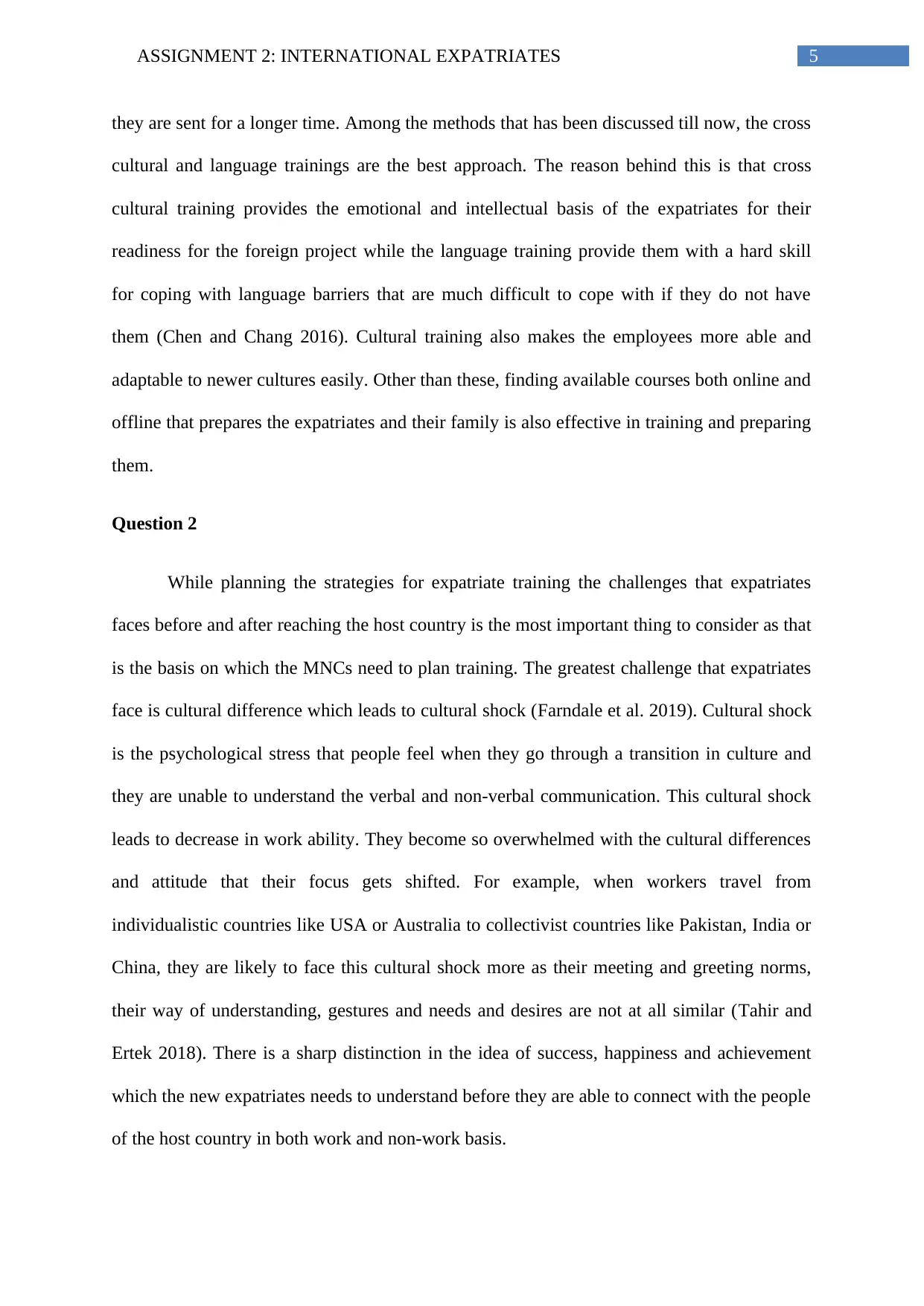
5ASSIGNMENT 2: INTERNATIONAL EXPATRIATES
they are sent for a longer time. Among the methods that has been discussed till now, the cross
cultural and language trainings are the best approach. The reason behind this is that cross
cultural training provides the emotional and intellectual basis of the expatriates for their
readiness for the foreign project while the language training provide them with a hard skill
for coping with language barriers that are much difficult to cope with if they do not have
them (Chen and Chang 2016). Cultural training also makes the employees more able and
adaptable to newer cultures easily. Other than these, finding available courses both online and
offline that prepares the expatriates and their family is also effective in training and preparing
them.
Question 2
While planning the strategies for expatriate training the challenges that expatriates
faces before and after reaching the host country is the most important thing to consider as that
is the basis on which the MNCs need to plan training. The greatest challenge that expatriates
face is cultural difference which leads to cultural shock (Farndale et al. 2019). Cultural shock
is the psychological stress that people feel when they go through a transition in culture and
they are unable to understand the verbal and non-verbal communication. This cultural shock
leads to decrease in work ability. They become so overwhelmed with the cultural differences
and attitude that their focus gets shifted. For example, when workers travel from
individualistic countries like USA or Australia to collectivist countries like Pakistan, India or
China, they are likely to face this cultural shock more as their meeting and greeting norms,
their way of understanding, gestures and needs and desires are not at all similar (Tahir and
Ertek 2018). There is a sharp distinction in the idea of success, happiness and achievement
which the new expatriates needs to understand before they are able to connect with the people
of the host country in both work and non-work basis.
they are sent for a longer time. Among the methods that has been discussed till now, the cross
cultural and language trainings are the best approach. The reason behind this is that cross
cultural training provides the emotional and intellectual basis of the expatriates for their
readiness for the foreign project while the language training provide them with a hard skill
for coping with language barriers that are much difficult to cope with if they do not have
them (Chen and Chang 2016). Cultural training also makes the employees more able and
adaptable to newer cultures easily. Other than these, finding available courses both online and
offline that prepares the expatriates and their family is also effective in training and preparing
them.
Question 2
While planning the strategies for expatriate training the challenges that expatriates
faces before and after reaching the host country is the most important thing to consider as that
is the basis on which the MNCs need to plan training. The greatest challenge that expatriates
face is cultural difference which leads to cultural shock (Farndale et al. 2019). Cultural shock
is the psychological stress that people feel when they go through a transition in culture and
they are unable to understand the verbal and non-verbal communication. This cultural shock
leads to decrease in work ability. They become so overwhelmed with the cultural differences
and attitude that their focus gets shifted. For example, when workers travel from
individualistic countries like USA or Australia to collectivist countries like Pakistan, India or
China, they are likely to face this cultural shock more as their meeting and greeting norms,
their way of understanding, gestures and needs and desires are not at all similar (Tahir and
Ertek 2018). There is a sharp distinction in the idea of success, happiness and achievement
which the new expatriates needs to understand before they are able to connect with the people
of the host country in both work and non-work basis.
⊘ This is a preview!⊘
Do you want full access?
Subscribe today to unlock all pages.

Trusted by 1+ million students worldwide
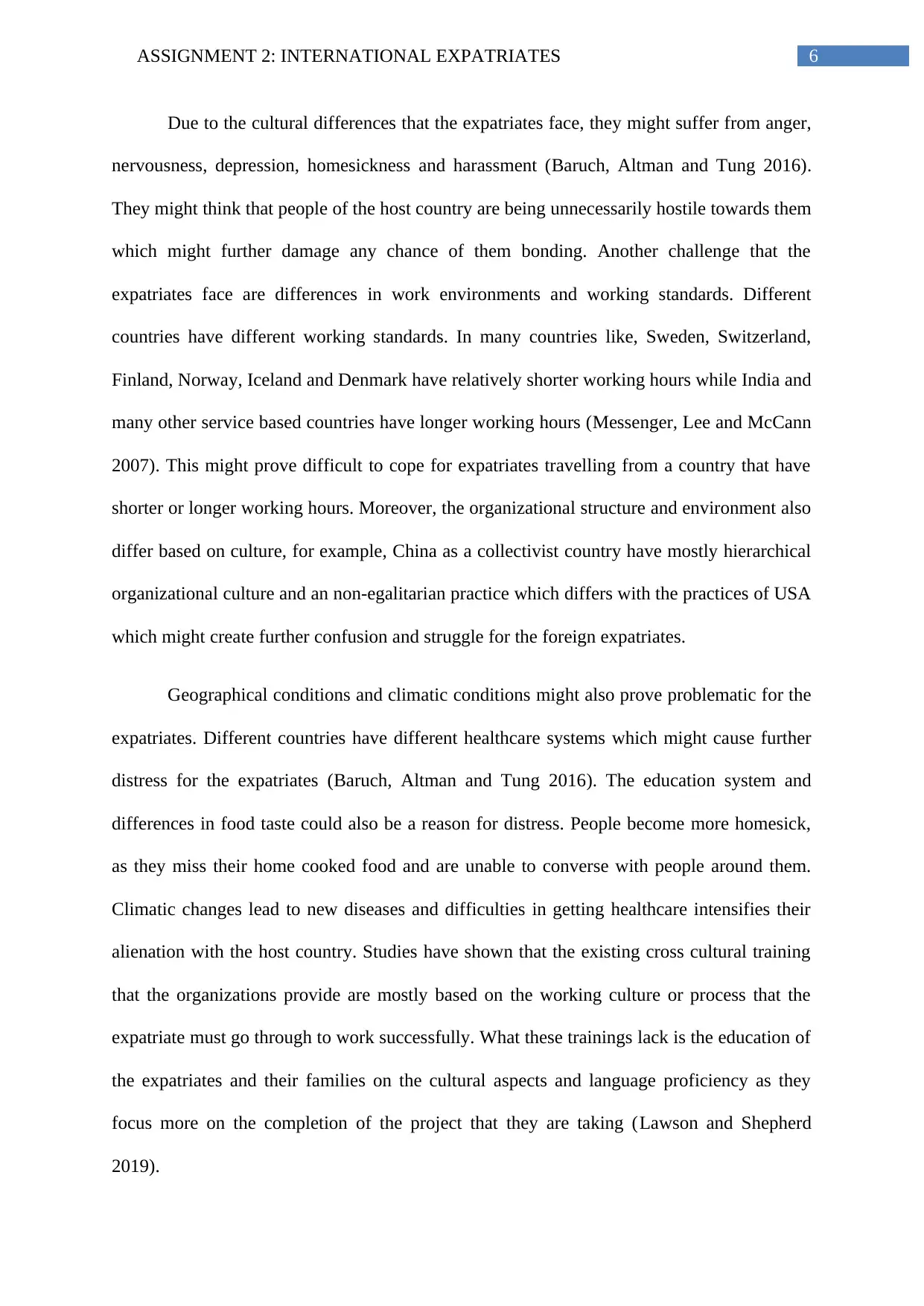
6ASSIGNMENT 2: INTERNATIONAL EXPATRIATES
Due to the cultural differences that the expatriates face, they might suffer from anger,
nervousness, depression, homesickness and harassment (Baruch, Altman and Tung 2016).
They might think that people of the host country are being unnecessarily hostile towards them
which might further damage any chance of them bonding. Another challenge that the
expatriates face are differences in work environments and working standards. Different
countries have different working standards. In many countries like, Sweden, Switzerland,
Finland, Norway, Iceland and Denmark have relatively shorter working hours while India and
many other service based countries have longer working hours (Messenger, Lee and McCann
2007). This might prove difficult to cope for expatriates travelling from a country that have
shorter or longer working hours. Moreover, the organizational structure and environment also
differ based on culture, for example, China as a collectivist country have mostly hierarchical
organizational culture and an non-egalitarian practice which differs with the practices of USA
which might create further confusion and struggle for the foreign expatriates.
Geographical conditions and climatic conditions might also prove problematic for the
expatriates. Different countries have different healthcare systems which might cause further
distress for the expatriates (Baruch, Altman and Tung 2016). The education system and
differences in food taste could also be a reason for distress. People become more homesick,
as they miss their home cooked food and are unable to converse with people around them.
Climatic changes lead to new diseases and difficulties in getting healthcare intensifies their
alienation with the host country. Studies have shown that the existing cross cultural training
that the organizations provide are mostly based on the working culture or process that the
expatriate must go through to work successfully. What these trainings lack is the education of
the expatriates and their families on the cultural aspects and language proficiency as they
focus more on the completion of the project that they are taking (Lawson and Shepherd
2019).
Due to the cultural differences that the expatriates face, they might suffer from anger,
nervousness, depression, homesickness and harassment (Baruch, Altman and Tung 2016).
They might think that people of the host country are being unnecessarily hostile towards them
which might further damage any chance of them bonding. Another challenge that the
expatriates face are differences in work environments and working standards. Different
countries have different working standards. In many countries like, Sweden, Switzerland,
Finland, Norway, Iceland and Denmark have relatively shorter working hours while India and
many other service based countries have longer working hours (Messenger, Lee and McCann
2007). This might prove difficult to cope for expatriates travelling from a country that have
shorter or longer working hours. Moreover, the organizational structure and environment also
differ based on culture, for example, China as a collectivist country have mostly hierarchical
organizational culture and an non-egalitarian practice which differs with the practices of USA
which might create further confusion and struggle for the foreign expatriates.
Geographical conditions and climatic conditions might also prove problematic for the
expatriates. Different countries have different healthcare systems which might cause further
distress for the expatriates (Baruch, Altman and Tung 2016). The education system and
differences in food taste could also be a reason for distress. People become more homesick,
as they miss their home cooked food and are unable to converse with people around them.
Climatic changes lead to new diseases and difficulties in getting healthcare intensifies their
alienation with the host country. Studies have shown that the existing cross cultural training
that the organizations provide are mostly based on the working culture or process that the
expatriate must go through to work successfully. What these trainings lack is the education of
the expatriates and their families on the cultural aspects and language proficiency as they
focus more on the completion of the project that they are taking (Lawson and Shepherd
2019).
Paraphrase This Document
Need a fresh take? Get an instant paraphrase of this document with our AI Paraphraser
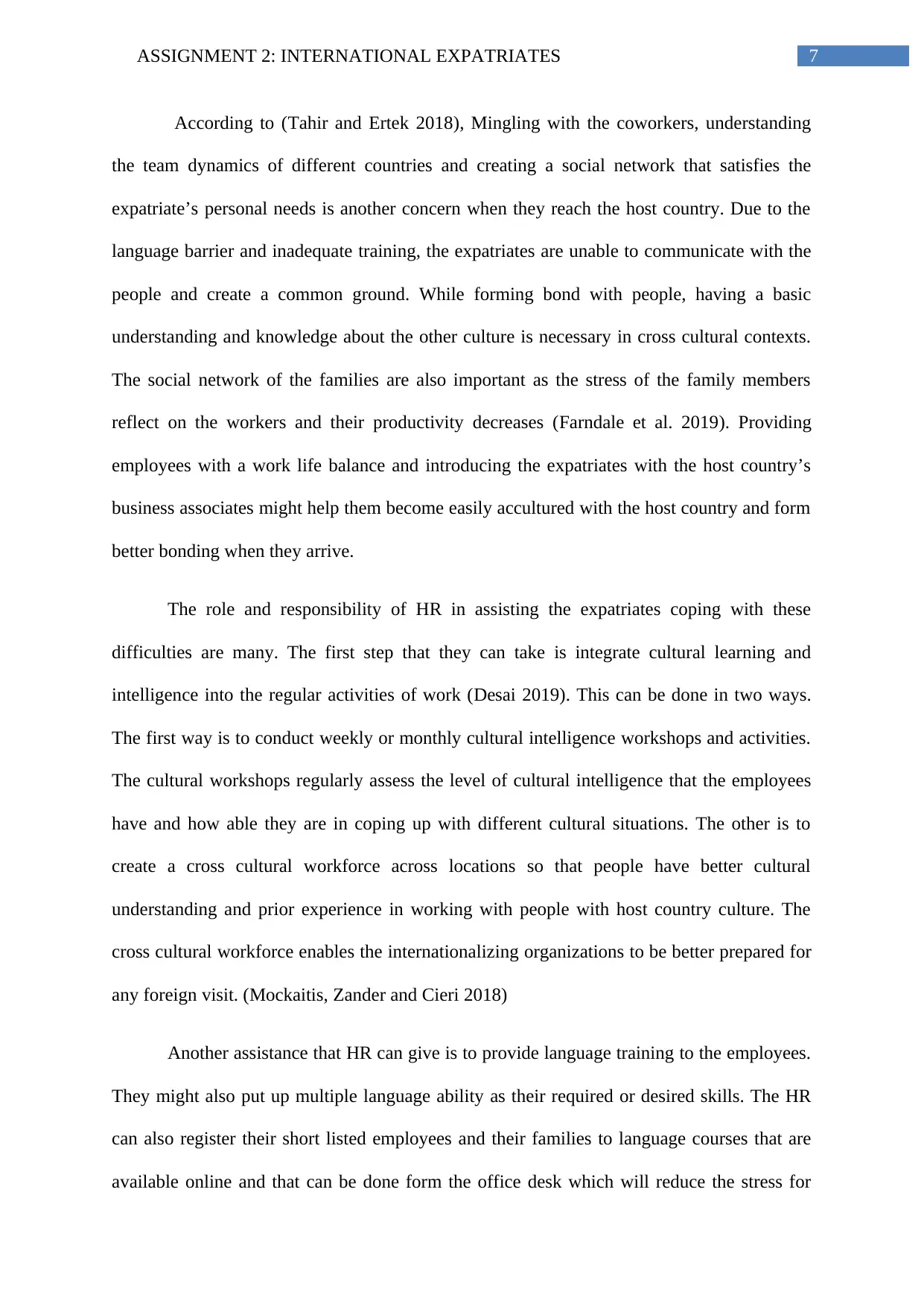
7ASSIGNMENT 2: INTERNATIONAL EXPATRIATES
According to (Tahir and Ertek 2018), Mingling with the coworkers, understanding
the team dynamics of different countries and creating a social network that satisfies the
expatriate’s personal needs is another concern when they reach the host country. Due to the
language barrier and inadequate training, the expatriates are unable to communicate with the
people and create a common ground. While forming bond with people, having a basic
understanding and knowledge about the other culture is necessary in cross cultural contexts.
The social network of the families are also important as the stress of the family members
reflect on the workers and their productivity decreases (Farndale et al. 2019). Providing
employees with a work life balance and introducing the expatriates with the host country’s
business associates might help them become easily accultured with the host country and form
better bonding when they arrive.
The role and responsibility of HR in assisting the expatriates coping with these
difficulties are many. The first step that they can take is integrate cultural learning and
intelligence into the regular activities of work (Desai 2019). This can be done in two ways.
The first way is to conduct weekly or monthly cultural intelligence workshops and activities.
The cultural workshops regularly assess the level of cultural intelligence that the employees
have and how able they are in coping up with different cultural situations. The other is to
create a cross cultural workforce across locations so that people have better cultural
understanding and prior experience in working with people with host country culture. The
cross cultural workforce enables the internationalizing organizations to be better prepared for
any foreign visit. (Mockaitis, Zander and Cieri 2018)
Another assistance that HR can give is to provide language training to the employees.
They might also put up multiple language ability as their required or desired skills. The HR
can also register their short listed employees and their families to language courses that are
available online and that can be done form the office desk which will reduce the stress for
According to (Tahir and Ertek 2018), Mingling with the coworkers, understanding
the team dynamics of different countries and creating a social network that satisfies the
expatriate’s personal needs is another concern when they reach the host country. Due to the
language barrier and inadequate training, the expatriates are unable to communicate with the
people and create a common ground. While forming bond with people, having a basic
understanding and knowledge about the other culture is necessary in cross cultural contexts.
The social network of the families are also important as the stress of the family members
reflect on the workers and their productivity decreases (Farndale et al. 2019). Providing
employees with a work life balance and introducing the expatriates with the host country’s
business associates might help them become easily accultured with the host country and form
better bonding when they arrive.
The role and responsibility of HR in assisting the expatriates coping with these
difficulties are many. The first step that they can take is integrate cultural learning and
intelligence into the regular activities of work (Desai 2019). This can be done in two ways.
The first way is to conduct weekly or monthly cultural intelligence workshops and activities.
The cultural workshops regularly assess the level of cultural intelligence that the employees
have and how able they are in coping up with different cultural situations. The other is to
create a cross cultural workforce across locations so that people have better cultural
understanding and prior experience in working with people with host country culture. The
cross cultural workforce enables the internationalizing organizations to be better prepared for
any foreign visit. (Mockaitis, Zander and Cieri 2018)
Another assistance that HR can give is to provide language training to the employees.
They might also put up multiple language ability as their required or desired skills. The HR
can also register their short listed employees and their families to language courses that are
available online and that can be done form the office desk which will reduce the stress for
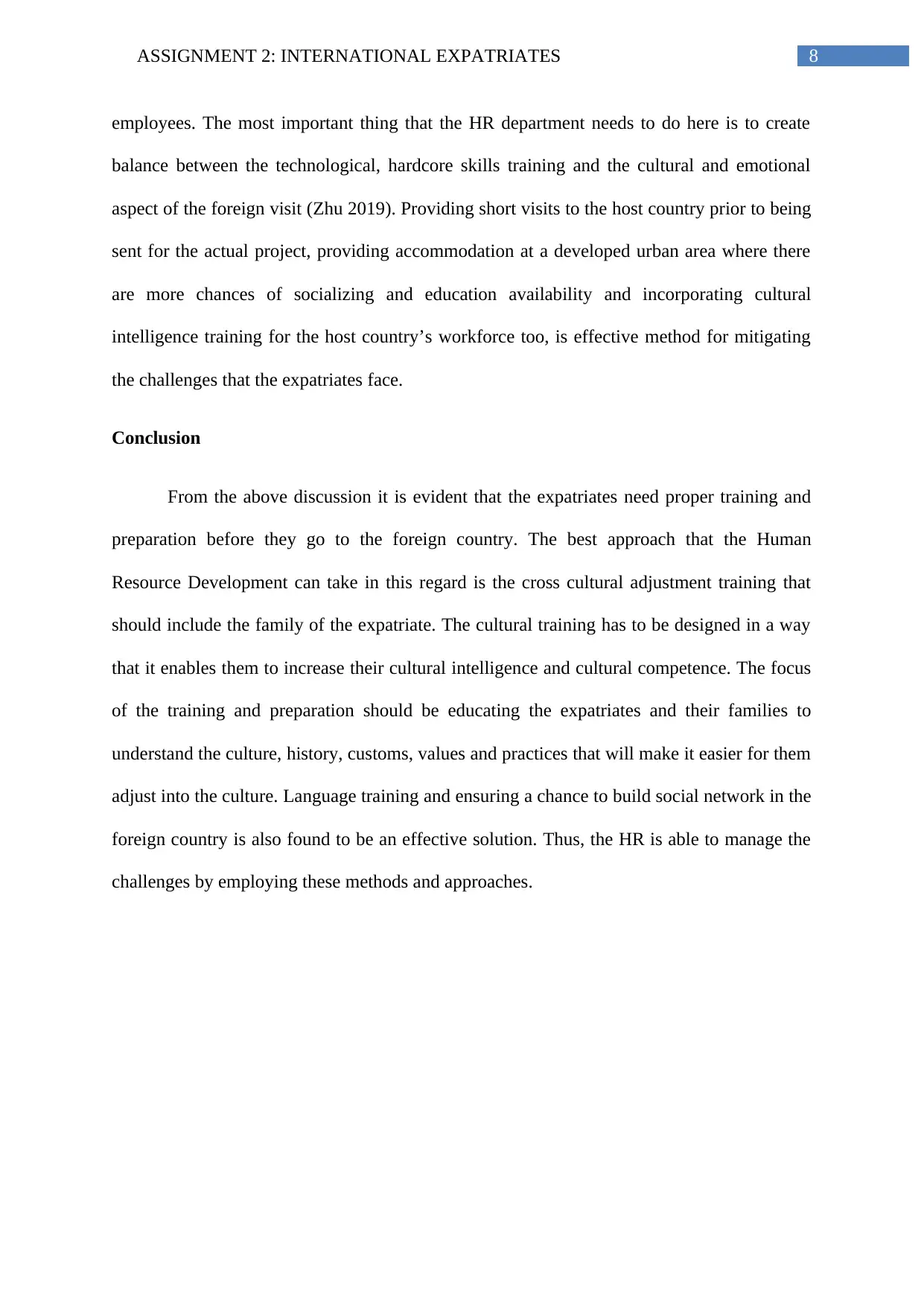
8ASSIGNMENT 2: INTERNATIONAL EXPATRIATES
employees. The most important thing that the HR department needs to do here is to create
balance between the technological, hardcore skills training and the cultural and emotional
aspect of the foreign visit (Zhu 2019). Providing short visits to the host country prior to being
sent for the actual project, providing accommodation at a developed urban area where there
are more chances of socializing and education availability and incorporating cultural
intelligence training for the host country’s workforce too, is effective method for mitigating
the challenges that the expatriates face.
Conclusion
From the above discussion it is evident that the expatriates need proper training and
preparation before they go to the foreign country. The best approach that the Human
Resource Development can take in this regard is the cross cultural adjustment training that
should include the family of the expatriate. The cultural training has to be designed in a way
that it enables them to increase their cultural intelligence and cultural competence. The focus
of the training and preparation should be educating the expatriates and their families to
understand the culture, history, customs, values and practices that will make it easier for them
adjust into the culture. Language training and ensuring a chance to build social network in the
foreign country is also found to be an effective solution. Thus, the HR is able to manage the
challenges by employing these methods and approaches.
employees. The most important thing that the HR department needs to do here is to create
balance between the technological, hardcore skills training and the cultural and emotional
aspect of the foreign visit (Zhu 2019). Providing short visits to the host country prior to being
sent for the actual project, providing accommodation at a developed urban area where there
are more chances of socializing and education availability and incorporating cultural
intelligence training for the host country’s workforce too, is effective method for mitigating
the challenges that the expatriates face.
Conclusion
From the above discussion it is evident that the expatriates need proper training and
preparation before they go to the foreign country. The best approach that the Human
Resource Development can take in this regard is the cross cultural adjustment training that
should include the family of the expatriate. The cultural training has to be designed in a way
that it enables them to increase their cultural intelligence and cultural competence. The focus
of the training and preparation should be educating the expatriates and their families to
understand the culture, history, customs, values and practices that will make it easier for them
adjust into the culture. Language training and ensuring a chance to build social network in the
foreign country is also found to be an effective solution. Thus, the HR is able to manage the
challenges by employing these methods and approaches.
⊘ This is a preview!⊘
Do you want full access?
Subscribe today to unlock all pages.

Trusted by 1+ million students worldwide
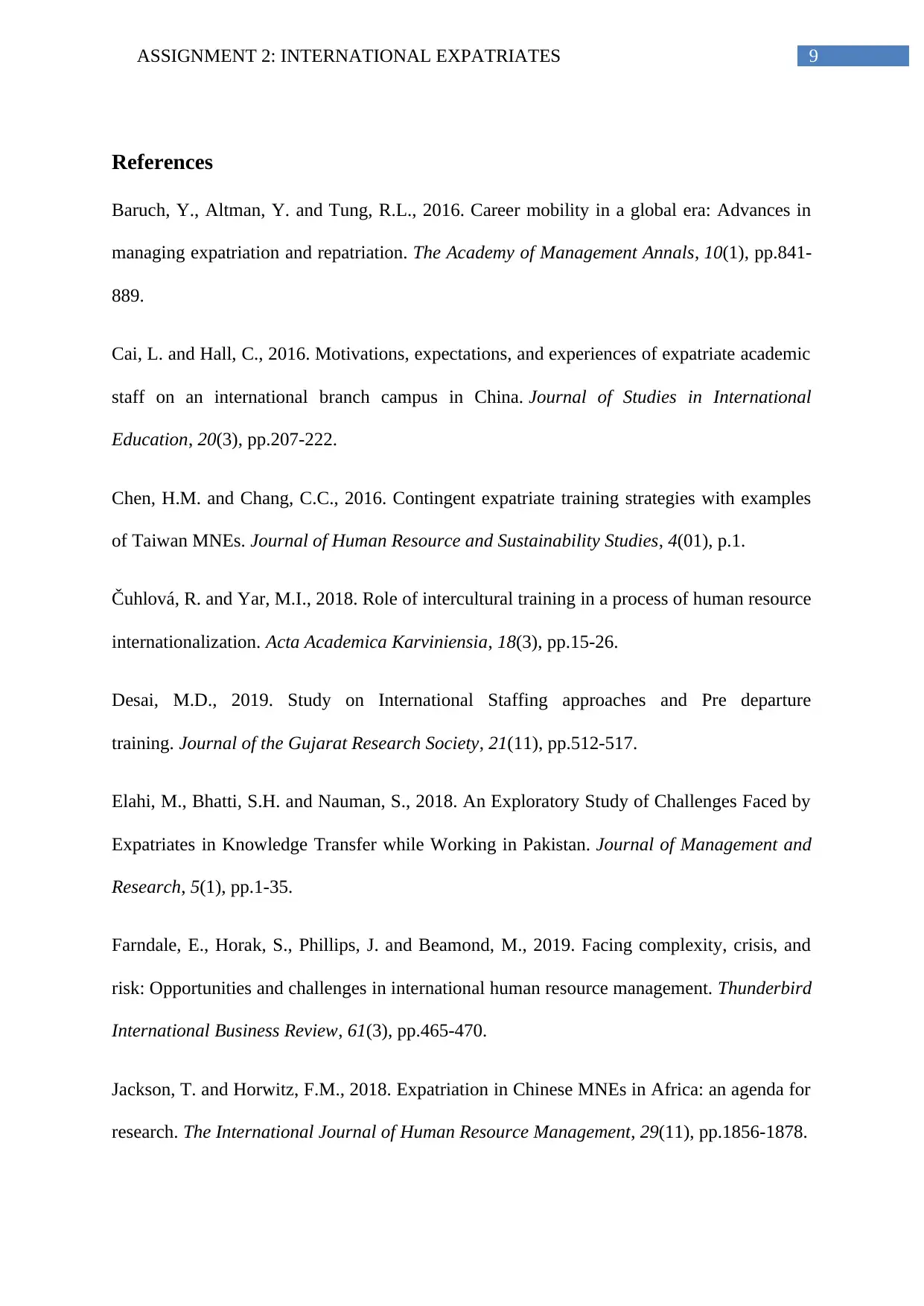
9ASSIGNMENT 2: INTERNATIONAL EXPATRIATES
References
Baruch, Y., Altman, Y. and Tung, R.L., 2016. Career mobility in a global era: Advances in
managing expatriation and repatriation. The Academy of Management Annals, 10(1), pp.841-
889.
Cai, L. and Hall, C., 2016. Motivations, expectations, and experiences of expatriate academic
staff on an international branch campus in China. Journal of Studies in International
Education, 20(3), pp.207-222.
Chen, H.M. and Chang, C.C., 2016. Contingent expatriate training strategies with examples
of Taiwan MNEs. Journal of Human Resource and Sustainability Studies, 4(01), p.1.
Čuhlová, R. and Yar, M.I., 2018. Role of intercultural training in a process of human resource
internationalization. Acta Academica Karviniensia, 18(3), pp.15-26.
Desai, M.D., 2019. Study on International Staffing approaches and Pre departure
training. Journal of the Gujarat Research Society, 21(11), pp.512-517.
Elahi, M., Bhatti, S.H. and Nauman, S., 2018. An Exploratory Study of Challenges Faced by
Expatriates in Knowledge Transfer while Working in Pakistan. Journal of Management and
Research, 5(1), pp.1-35.
Farndale, E., Horak, S., Phillips, J. and Beamond, M., 2019. Facing complexity, crisis, and
risk: Opportunities and challenges in international human resource management. Thunderbird
International Business Review, 61(3), pp.465-470.
Jackson, T. and Horwitz, F.M., 2018. Expatriation in Chinese MNEs in Africa: an agenda for
research. The International Journal of Human Resource Management, 29(11), pp.1856-1878.
References
Baruch, Y., Altman, Y. and Tung, R.L., 2016. Career mobility in a global era: Advances in
managing expatriation and repatriation. The Academy of Management Annals, 10(1), pp.841-
889.
Cai, L. and Hall, C., 2016. Motivations, expectations, and experiences of expatriate academic
staff on an international branch campus in China. Journal of Studies in International
Education, 20(3), pp.207-222.
Chen, H.M. and Chang, C.C., 2016. Contingent expatriate training strategies with examples
of Taiwan MNEs. Journal of Human Resource and Sustainability Studies, 4(01), p.1.
Čuhlová, R. and Yar, M.I., 2018. Role of intercultural training in a process of human resource
internationalization. Acta Academica Karviniensia, 18(3), pp.15-26.
Desai, M.D., 2019. Study on International Staffing approaches and Pre departure
training. Journal of the Gujarat Research Society, 21(11), pp.512-517.
Elahi, M., Bhatti, S.H. and Nauman, S., 2018. An Exploratory Study of Challenges Faced by
Expatriates in Knowledge Transfer while Working in Pakistan. Journal of Management and
Research, 5(1), pp.1-35.
Farndale, E., Horak, S., Phillips, J. and Beamond, M., 2019. Facing complexity, crisis, and
risk: Opportunities and challenges in international human resource management. Thunderbird
International Business Review, 61(3), pp.465-470.
Jackson, T. and Horwitz, F.M., 2018. Expatriation in Chinese MNEs in Africa: an agenda for
research. The International Journal of Human Resource Management, 29(11), pp.1856-1878.
Paraphrase This Document
Need a fresh take? Get an instant paraphrase of this document with our AI Paraphraser
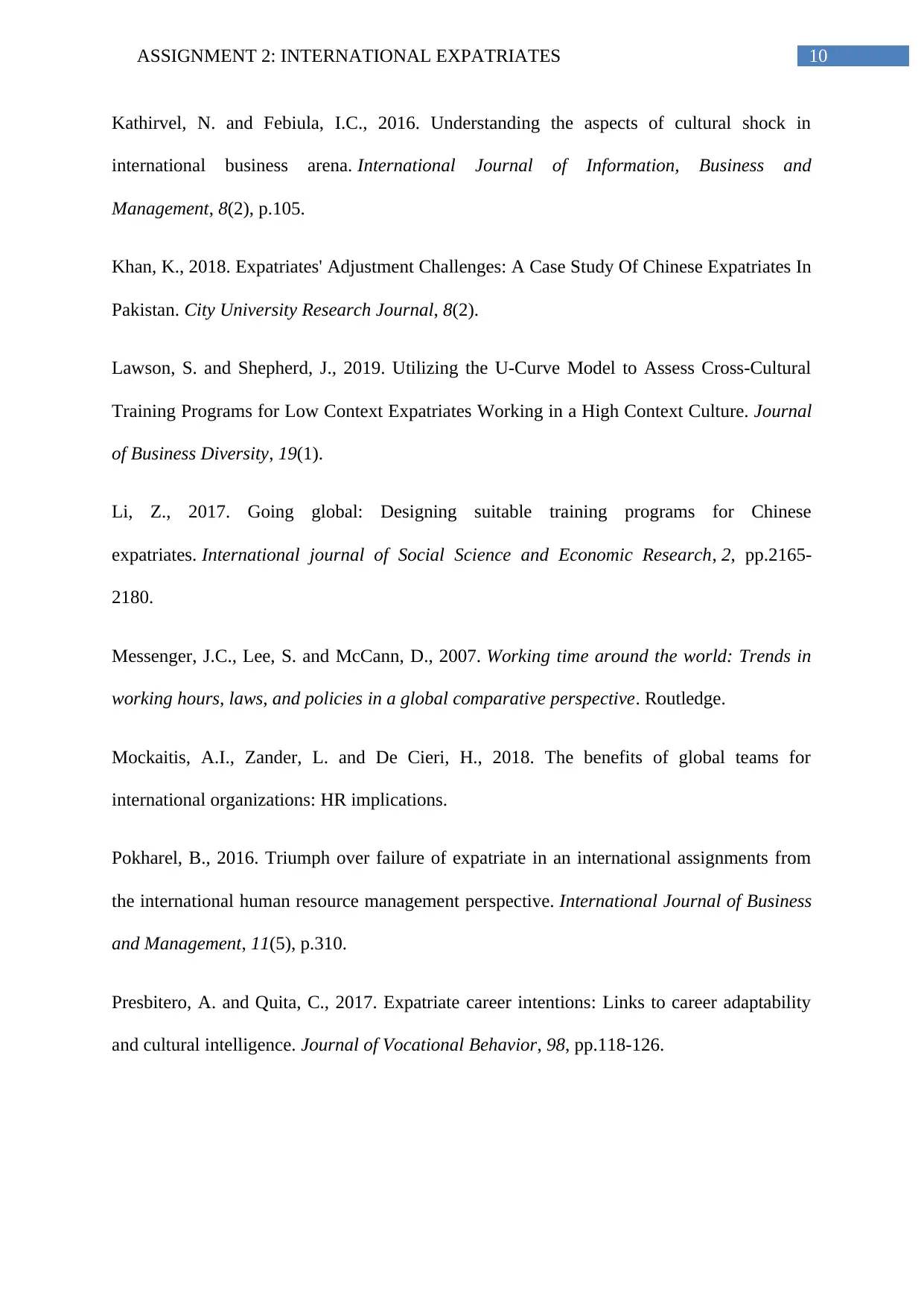
10ASSIGNMENT 2: INTERNATIONAL EXPATRIATES
Kathirvel, N. and Febiula, I.C., 2016. Understanding the aspects of cultural shock in
international business arena. International Journal of Information, Business and
Management, 8(2), p.105.
Khan, K., 2018. Expatriates' Adjustment Challenges: A Case Study Of Chinese Expatriates In
Pakistan. City University Research Journal, 8(2).
Lawson, S. and Shepherd, J., 2019. Utilizing the U-Curve Model to Assess Cross-Cultural
Training Programs for Low Context Expatriates Working in a High Context Culture. Journal
of Business Diversity, 19(1).
Li, Z., 2017. Going global: Designing suitable training programs for Chinese
expatriates. International journal of Social Science and Economic Research, 2, pp.2165-
2180.
Messenger, J.C., Lee, S. and McCann, D., 2007. Working time around the world: Trends in
working hours, laws, and policies in a global comparative perspective. Routledge.
Mockaitis, A.I., Zander, L. and De Cieri, H., 2018. The benefits of global teams for
international organizations: HR implications.
Pokharel, B., 2016. Triumph over failure of expatriate in an international assignments from
the international human resource management perspective. International Journal of Business
and Management, 11(5), p.310.
Presbitero, A. and Quita, C., 2017. Expatriate career intentions: Links to career adaptability
and cultural intelligence. Journal of Vocational Behavior, 98, pp.118-126.
Kathirvel, N. and Febiula, I.C., 2016. Understanding the aspects of cultural shock in
international business arena. International Journal of Information, Business and
Management, 8(2), p.105.
Khan, K., 2018. Expatriates' Adjustment Challenges: A Case Study Of Chinese Expatriates In
Pakistan. City University Research Journal, 8(2).
Lawson, S. and Shepherd, J., 2019. Utilizing the U-Curve Model to Assess Cross-Cultural
Training Programs for Low Context Expatriates Working in a High Context Culture. Journal
of Business Diversity, 19(1).
Li, Z., 2017. Going global: Designing suitable training programs for Chinese
expatriates. International journal of Social Science and Economic Research, 2, pp.2165-
2180.
Messenger, J.C., Lee, S. and McCann, D., 2007. Working time around the world: Trends in
working hours, laws, and policies in a global comparative perspective. Routledge.
Mockaitis, A.I., Zander, L. and De Cieri, H., 2018. The benefits of global teams for
international organizations: HR implications.
Pokharel, B., 2016. Triumph over failure of expatriate in an international assignments from
the international human resource management perspective. International Journal of Business
and Management, 11(5), p.310.
Presbitero, A. and Quita, C., 2017. Expatriate career intentions: Links to career adaptability
and cultural intelligence. Journal of Vocational Behavior, 98, pp.118-126.
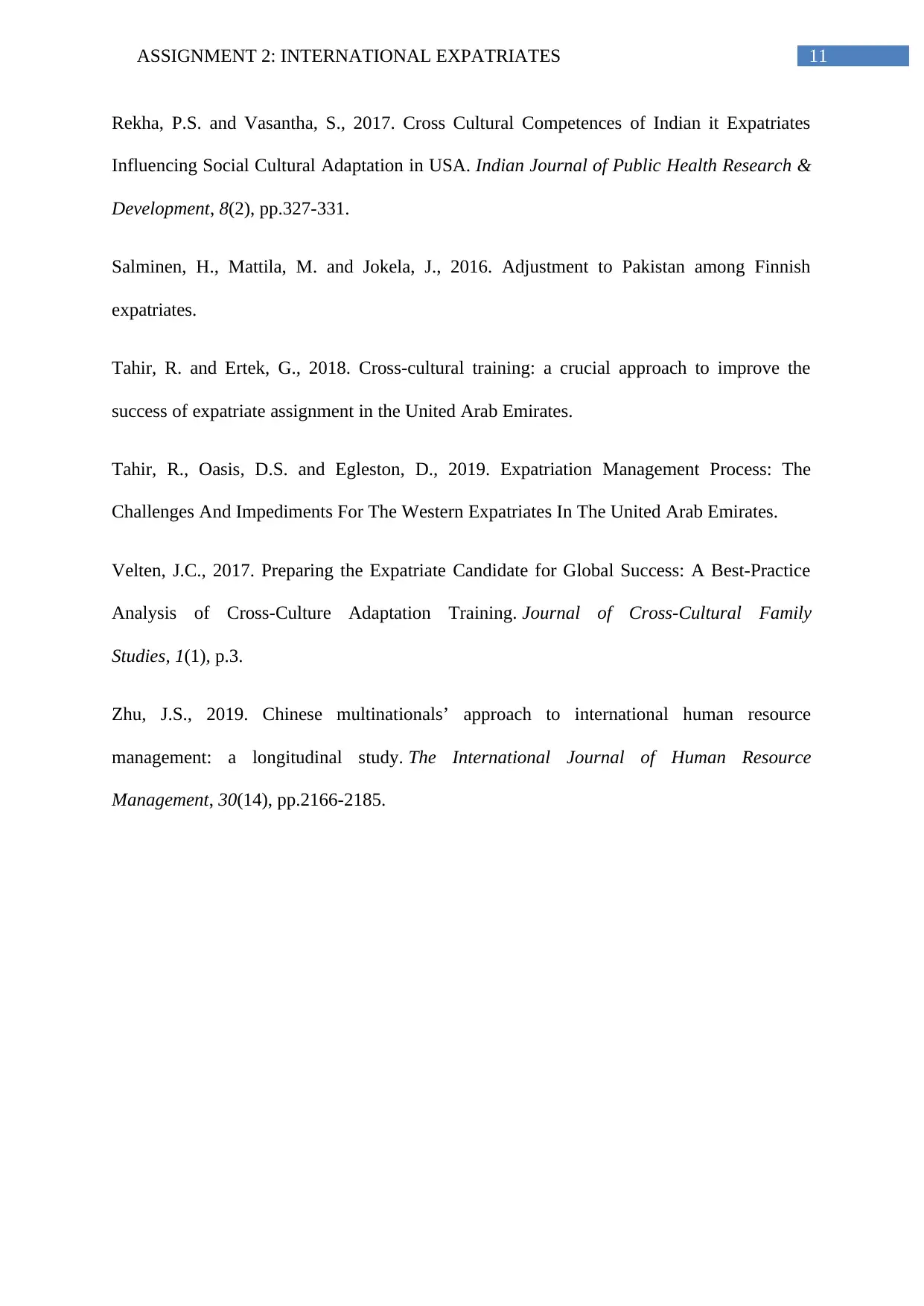
11ASSIGNMENT 2: INTERNATIONAL EXPATRIATES
Rekha, P.S. and Vasantha, S., 2017. Cross Cultural Competences of Indian it Expatriates
Influencing Social Cultural Adaptation in USA. Indian Journal of Public Health Research &
Development, 8(2), pp.327-331.
Salminen, H., Mattila, M. and Jokela, J., 2016. Adjustment to Pakistan among Finnish
expatriates.
Tahir, R. and Ertek, G., 2018. Cross-cultural training: a crucial approach to improve the
success of expatriate assignment in the United Arab Emirates.
Tahir, R., Oasis, D.S. and Egleston, D., 2019. Expatriation Management Process: The
Challenges And Impediments For The Western Expatriates In The United Arab Emirates.
Velten, J.C., 2017. Preparing the Expatriate Candidate for Global Success: A Best-Practice
Analysis of Cross-Culture Adaptation Training. Journal of Cross-Cultural Family
Studies, 1(1), p.3.
Zhu, J.S., 2019. Chinese multinationals’ approach to international human resource
management: a longitudinal study. The International Journal of Human Resource
Management, 30(14), pp.2166-2185.
Rekha, P.S. and Vasantha, S., 2017. Cross Cultural Competences of Indian it Expatriates
Influencing Social Cultural Adaptation in USA. Indian Journal of Public Health Research &
Development, 8(2), pp.327-331.
Salminen, H., Mattila, M. and Jokela, J., 2016. Adjustment to Pakistan among Finnish
expatriates.
Tahir, R. and Ertek, G., 2018. Cross-cultural training: a crucial approach to improve the
success of expatriate assignment in the United Arab Emirates.
Tahir, R., Oasis, D.S. and Egleston, D., 2019. Expatriation Management Process: The
Challenges And Impediments For The Western Expatriates In The United Arab Emirates.
Velten, J.C., 2017. Preparing the Expatriate Candidate for Global Success: A Best-Practice
Analysis of Cross-Culture Adaptation Training. Journal of Cross-Cultural Family
Studies, 1(1), p.3.
Zhu, J.S., 2019. Chinese multinationals’ approach to international human resource
management: a longitudinal study. The International Journal of Human Resource
Management, 30(14), pp.2166-2185.
⊘ This is a preview!⊘
Do you want full access?
Subscribe today to unlock all pages.

Trusted by 1+ million students worldwide
1 out of 12
Related Documents
Your All-in-One AI-Powered Toolkit for Academic Success.
+13062052269
info@desklib.com
Available 24*7 on WhatsApp / Email
![[object Object]](/_next/static/media/star-bottom.7253800d.svg)
Unlock your academic potential
Copyright © 2020–2026 A2Z Services. All Rights Reserved. Developed and managed by ZUCOL.





